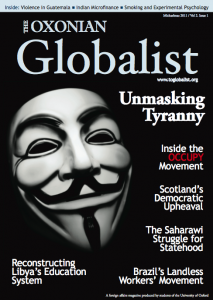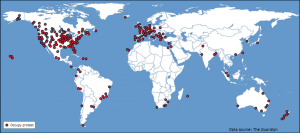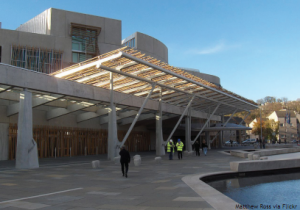 Freedom is a term seldom used with any precise meaning, yet throughout our history it has inspired great thinkers and intrepid revolutionaries. Its allure and status as a cherished ideal is at odds with the reality, for the majority of people it is nothing more than an unrealised, often seemingly unobtainable, fantasy. Those claiming to be the guardians of liberty have become tyrants in themselves. Whilst the greatest hope of the modern world for the extension of free speech and expression, the internet, has become a battleground for the confrontation between proponents of unlimited expression and the darker malignancies that such freedom allows.
Freedom is a term seldom used with any precise meaning, yet throughout our history it has inspired great thinkers and intrepid revolutionaries. Its allure and status as a cherished ideal is at odds with the reality, for the majority of people it is nothing more than an unrealised, often seemingly unobtainable, fantasy. Those claiming to be the guardians of liberty have become tyrants in themselves. Whilst the greatest hope of the modern world for the extension of free speech and expression, the internet, has become a battleground for the confrontation between proponents of unlimited expression and the darker malignancies that such freedom allows.
Freedom remains a privilege that millions aspire to and many more have died for and yet all too often, those freedoms which only a small portion of the world can take for granted – freedom of religion, press, association, speech – are threatened. This issue of The Oxonian Globalist offers just a glimpse of the paradox of the freedom of speech and some of its controversies and contradictions, the implications of which affect us all.
Other articles in this issue include a look at female wrestlers in Bolivia, the challenges of counting the poor, the difficulties of insuring against the increasingly frequent natural disasters and a perspective on the relationship between the car and American identity. These are just a snapshot of the variety of fascinating issues considered by our writers.
We hope you enjoy this issue. If you have any thoughts or comments, or would like to become part of the Globalist team please e-mail [email protected].
Thank you for your continued support,

Editors:
Editors:
Stephen Wan, Print Editor
Sophie Stewart, Editor-in-Chief

Download in Progress: Is banning the illegal use of copyrighted material impinging on the human right to freedom of speech? Photo by Mike Davis via Flickr.
ON January 18th, popular websites Wikipedia and Reddit shut down in protest against a new copyright protection bill that was then under consideration by the United States Congress. The Stop Online Piracy Act (SOPA) and the PROTECT IP Act (PIPA) were the latest government efforts at curbing the sharing of copyrighted material online. The issue pits the usual contenders of traditional media companies, who see strict regulation as the only way to prevent the destruction of their industry, against online content providers and free speech advocates, who see the proposed legislation as deliberate silencing at its worst.
The protests were sufficient to derail the legislative process. On the day of the blackout, six Republican supporters of PIPA, Senators Kelly Ayotte of New Hampshire, John Boozman of Arkansas, Roy Blunt of Missouri, Orrin Hatch of Utah, Mark Kirk of Illinois and Marco Rubio of Florida, had withdrawn their support. By the end of January 19th, the legislative coalition behind SOPA and PIPA had collapsed and the bills were shelved indefinitely.
Despite the widespread opposition, however, it remains likely that similar legislation will still be considered. In his response to the petition against SOPA, President Barack Obama stated that while he would not support legislation that would lead to censorship of the Internet or damage innovation, he would encourage legislation that “provides prosecutors and rights holders new legal tools to combat online piracy originating beyond US borders”.
President Obama’s statement captures a central issue in governmental struggles against internet piracy. In order to be successful, legislation must address not only domestic but also international sources of copyrighted material. Traditionally, anti-piracy efforts have focused on persistent domestic users. In October 2009, the French government adopted a law to suspend the internet access of anyone receiving three warning letters for online copyright infringement in a year. Similar legislation was included in the 2010 Digital Economy Act in the United Kingdom, although this has yet to be implemented. In the United States, file sharers have been combated largely through civil cases by the media industry.
Failed Attempts
Action against the providers of copyrighted material has been stymied by the international and shifting nature of file sharing. The Pirate Bay, self-declared as “the galaxy’s most resilient BitTorrent site”, even goes so far as to keep the location of its servers secret, and has at various points in its history been hosted in Sweden, the Netherlands, and Ukraine. Recently proposed legislation, such as SOPA and PIPA, would have allowed governments to force internet service providers to block access to websites that provide copyrighted material.
Similar provisions were to be included in the 2010 Digital Economy Act, although they were later removed after a review by Ofcom, an independent regulator of TV, radio and wireless airwaves in the United Kingdom. Legislation like this demonstrates that national governments recognise that any effective campaign against online copyright infringement must be inter- national. However, the prospect of ordering Internet Service Providers to block offending websites attracts criticism from internet freedom groups, who have accused governments of promoting censorship and forecasted the death of websites such as YouTube that host user-generated content. Sir Tim Berners-Lee, inventor of the World Wide Web, argued that SOPA and PIPA had “not been put together to respect human rights as is appropriate in a democratic country”.
One potential successor to the failed bills is the Anti- Counterfeiting Trade Agreement (ACTA), a plurilateral trade agreement that has been under negotiation since 2007. In a January entry on the Electronic Frontier Foundation Deeplinks blog, they described ACTA as the “one thing that encapsulates what’s wrong with the way government functions today” because of the lack of transparency with which it was negotiated.
The objective of ACTA is to standardise domestic anti-piracy legislation across much of the industrialised world, despite having no domestic force. As a trade agreement, its stipulations are quite vague, and much of the concern over early drafts is not justified by the most recent version. In effect, ACTA is only a threat to internet freedom after individual signatories have passed enabling legislation.
The Virtual becomes Physical
In addition to the aforementioned blackout in response to PIPA and SOPA, a petition organised by Google gathered over 7 million signatures, and the online protests were accompanied by real-world demonstrations, indicating the growing salience of internet-related issues in real-world politics. On February 3rd, the Polish Prime Minister Donald Tusk announced that his country’s ratification of ACTA would be suspended pending further consultations. This reversal came after days of street protests in late January and a protest in Parliament on the 26th in which opposition politicians donned the Guy Fawkes masks made infamous by Anonymous, the “hactivist” group also known for their Denial of Service attacks against government websites.
In the United States, online protests against SOPA and PIPA were accompanied by demonstrations in New York City, Seattle, and San Francisco. On the extreme end of the internet freedom debate, several European states have seen the rise of Pirate Parties, political parties that campaign on a platform of internet freedom and reform of copyright and patent law. While their electoral success has been limited, the Piratenpartei Deutschland currently holds 15 state parliament seats in Berlin, and the Swedish Piratpartiet has sent two members to the European Parliament.
There are two key lessons to be drawn from recent clashes over anti-piracy legislation. First, all future legislation will concentrate on preventing the supply of copyright-infringing material as well as prosecuting those who consume it. Second, that the architects and proponents of stricter online regulation have already lost the public relations battle. The vociferous response, both online and offline, to SOPA and PIPA indicates that digital natives will fight on the world stage.
]]>
Violent Clashes: Police arresting a man at Occupy Wall Street after having run over his foot on their motorbike. Photo by Scott Dread via Flickr.
THE freedom of the press is one of the five freedoms enshrined in the First Amendment of the United States Constitution, an amendment which has achieved an almost religious signifi- cance in the American political tradition. It therefore comes as a surprise that in the latest World Press Freedom Index released by Reporters Without Borders (RSF), the United States has fallen 27 places over the past year to rank 47th in the world.
According to the report, this decline is attributable to the arrests of journalist covering the Occupy Wall Street protests.
“In the space of two months,” says the report, “in the United States more than 25 [journalists] were subjected to arrests and beatings at the hands of police who were quick to issue indict- ments for inappropriate behaviour, public nuisance or even lack of accreditation.”
The Occupy Wall Street movement protested against the growing income inequality in the United States and targets the financial services sector as responsible. While they achieved very few tangible results in the way of governmental policy shifts, they have sparked a discourse across the country over corporate power.
The arresting of journalists covering the protests, therefore, is a troubling development that RSF was right to point out.
Josh Stearns, the Journalism and Public Media Campaign Director of Free Press, a non-profit organization working to reform the media, has compiled a list of all journalists arrested while covering the Occupy movement. As of the writing of this article, the number of arrests has reached 59.
Stearns, however, says that he does not believe these journal- ists are being arrested specifically because they are covering the movement, but instead are just being swept up into the larger set of arrests at each protest. “However, that doesn’t excuse these actions,” he adds, “espe-
cially when journalists are actively identifying themselves as press and being ignored – or worse, having press credentials removed during police actions.”
A Common Thread?
While Stearns does not see the arrests as specifically targeting journalists covering the Occupy movement, he does see them as part of a growing crackdown against a new demographic of independent and freelance journalists resulting from the growth of online journalism. A glance at his list reveals that many of the journalists arrested were freelancers or citizen journalists not associated with large media institutions.
Nevertheless, the list also contains journalists representing more prestigious newspapers and magazines such as the San Francisco Chronicle, Mother Jones, ABC News, the New York Times, and even the Associated Press. The arrests are therefore clearly not limited to independent journalists, though they may make up a larger portion of the list.
When asked whether this type of crackdown on journalists is a unique phenomenon in the United States, Stearns mentioned the protest at the Republican National Convention of 2008 in St. Paul, where more than fifty journalists were arrested in a week. Among the most prominent were Democracy Now! reporter Amy Goodman and producers Abdel Kouddous and Nicole Salazar.
“The video of Salazar’s violent arrest still gives me chills,” says Stearns.
He does add that through an online petition launched by Free Press, journalists detained in St. Paul were freed, and many, among them Amy Goodman, received a settlement from the police.
Interestingly, this incident in St. Paul did not affect the ranking of the United States in RSF’s 2009 World Press Freedom Index, perhaps because it was an isolated incident compared to the Occupy arrests, which have occurred across the country.
Cracking Down on Coverage
As of now arrests of journalists at Occupy movements are still ongoing, with 14 already detained in 2012. The most recent was Jacqui Kubin, a reporter for the Washington Times, who was arrested at an Occupy movement in Washington D.C. on February 10. This arrest, like many others, has received very little press coverage.
Stearns, however, is confident that these arrests will not limit public exposure to the Occupy movement, stating that “the journalist arrests have become a story in and of themselves and have helped to highlight aspects of the Occupy movement and the police reaction”.
Stearns analysis is confirmed by press coverage of the U.S. decline in the RSF ranking. The major media outlets that have reported on this decline have highlighted the reference made in the report to the crackdown on journalists reporting on the Occupy movement.
Perhaps if these arrests continue to receive more press coverage, the United States can reclaim some of its lost ground in the next World Press Freedom Index. According to Press Freedom Indices from earlier years, the country suffered a similar slip in the rankings during the Bush administration, when many journalists critical in their coverage of the war on terror were arrested for “national security” purposes. With the election of President Obama, however, the U.S. was able to recover 16 places in the index in one year, due to what the RSF perceived as a different approach to the war on terror that resulted in fewer arrests of journalists.
Reversing the current decline will take more than just a shift in national policy. But through a greater public awareness of the issue as well as collective action by its citizens, the United States can return to its former position in the rankings and once again be able to revere its First Amendment freedom.
]]>
Hate Crimes in Canada
RACE is a concept which historically has organized many societies. Sanjeev S Anand, in Expressions of Racial Hatred and Racism in Canada: An Historical Perspective, defines racism as “the belief that one race is superior to another, and this belief is associated with attitudes and acts.” After learning a lesson from the atrocities of the Nazis against the Jewish people, many countries – including Canada – do not accept that race has any biological basis that determines superiority or inferiority.
Thus, Canada has undertaken initiatives to protect all “racial” groups, through its multicultural policy. Also, as Anand states, the Charter added in 1982, stipulates that “[t]his Charter shall be interpreted in a manner consistent with the preservation and enhancement of the multicultural heritage of Canadians.” Because the government has adopted and tries to promulgate the idea that a person’s race is not a valid reason for discrimination, Canada is perceived as a society tolerant of “cultural diversity.” However, as Anand indicates, in Canada alone there are at least 75 hate organizations that use the internet to spread their hatred. Given the prevalence of these white supremacists groups, hate sites and the effects that these have on many individuals (such as teenagers), racism is still a problem in Canada. The internet allows for the promulgation of racist views in new and possibly more efficient ways because it is easily accessible to millions of people. Moreover, it is difficult to censor such material because of the technology it employs and freedom of expression rights guaranteed by the Charter.
On-line Recruiting
Websites allow hate organizations to access new groups of people. The internet can be accessed more easily than other methods used by hate groups in the past. As Joe Roy (cited by Margaret E Duffy in Web of Hate: A Fantasy Theme Analysis of the Rhetorical Vision of Hate Groups Online) says, “There’s no question that the Net is one of the key factors in the growth of hate groups[...] These groups are reaching people who would’ve never been exposed to it otherwise”. In other words, the internet is a more efficient modern method to attract and recruit members. For example, Elissa Lee and Laura Leets in Persuasive Storytelling by Hate Groups Online: Examining its Effects on Adolescents indicate that in the past, the Nazis would use “fliers, newsletters, small rallies, mailings, and inter- personal contact[,]” mostly for targeting people who had the same “beliefs” or were part of the group and thus “predisposed to accept the messages.” However, the internet can recruit or persuade many more people.
Youths are especially vulnerable to these messages. Lee and Leets have found that male teenagers generally use the internet more often than any other group; and a poll in US found that 25% of teens have seen hate group websites. Moreover, Lee and Leets say that “[h]ate Web sites appear to be one of many potential pitfalls that await youths on the Internet.” In other words, young people are more likely to view websites because they spend more time than any other group browsing on the internet, making them more susceptible to hateful messages. Youths are not only more likely to view these websites because of their greater use of the internet, but many of these hate websites specifically target youths, and try to convince them to believe in their ideology. Children and teenagers are attractive targets simply because they are in a stage of moral and intellectual development. Generally, once certain beliefs are ingrained at a young age, these ideas are not easily removed later in life; most likely, they tend to be reinforced. Lee and Leets show evidence suggesting that even former members of White supremacist hate groups have pointed out that the special target of hatred groups are “young, White, male teenagers”. A study in California found that many students in high school were physically “approached” or “recruited” by hate organizations.
Links to Crime
Hate crime reports suggest a possible a link between the viewing of hate sites and hate crime occurrences. The Canadian Centre for Justice Statistics show that in 2001 and 2002, twelve police forces indicated that 57% of hate crime incidents were about race or ethnicity issues, and visible minorities were over-represented as victims in these types of crimes. This pilot survey also found that in 83% of the cases, the perpetrators were not known to the victim, making the incident a hate crime because it shows that the victim was selected based on his/her racial or ethnic characteristics. Among these incidents, black victims had a higher chance of becoming victims, followed by South Asians, Arabs/West Asians, East and Southeast Asians, and lastly Whites. Not surprisingly, considering that many sites now target young individuals, the survey found that the perpetrators involved in these incidents were younger than previous perpetrators. In the past the average age of the men participating in hate crime was around 29.5 years, but the present average age is 23.6. Also, Duffy says that many studies have found that hate sites motivated hate incidents against African Americans and the shootings at Columbine High School in Littleton, Colorado. In other words, we see that some of the young people, who are targeted by many hate websites, may eventually engage in hate acts against other “racial” groups.
Free speech on the internet is almost impossible to censor and this contributes to an even greater effect on the promulgation of racist attitudes. This is the case for two main reasons. First, technologically it is difficult to regulate or disconnect hate websites. Some of these hate sites are not Canadian, so they are not under the jurisdiction of Canadian law. Many times, blocking a website is repeatedly undermined by the creation of “duplicates.” Anand says that in one case, in Germany, Deutsche Telekom tried to block a Santa Cruz Company that was spreading hate propaganda through its website. Deutsche Telekom failed, as many other “duplicates” were created by “free speech proponents.” Thus, hate sites constitute an almost unstoppable flow of information which aim to instigate racist attitudes. Secondly, from a legal perspective, prohibiting hate sites infringes on the freedom of expression, which is part of the same Charter that guaranteed multiculturalism. Both rights are highly valued in our society and to transgress either one, requires a lot of of convincing evidence. Many agree that some free speech should be prohibited. There have even been efforts by the Canadian government to try and put some limits on free speech. One such effort was the Cohen report in 1965. This Special Committee on Hate Propaganda in Canada said that some form of speech should be prohibited because our society is more diverse, and during times of stress we tend to put the blame for our problems on others. In other words, they were worried about racist scapegoating. The recommendations of this report, Anand says, led to hate propaganda laws. Nevertheless, thus far there have only been a few cases with convictions. We can see from Statistics Canada that hate propaganda is the least common form of hate crimes reported, whereas mischief and assault are the highest. If hate crime involves an act then it is easier to detect. However, if the act involves speech, it is more difficult to prove. Hate websites are prevalent and can exert significant influence but because of the right to freedom of expression, they can almost never be effectively censored.
To conclude, although Canada has made many efforts to encourage diversity (such as through the Multiculturalism Act and the Charter), racism has not been erased. Hate sites are better instrument for the spread of racist ideas than methods used in the past. Moreover, hate sites are a stable source of racist ideas as they cannot easily be censored. Hate sites transcend borders and thus cannot be controlled by the Canadian legal system. Even when these sites are Canadian, censoring them is difficult because many people can create duplicates and can also claim that the act of controlling them violates their freedom of expression guaranteed by the Charter of Rights and Freedoms. Thus, hates sites are not only pernicious in themselves but also cause racist attitudes to become prevalent in Canada.
]]>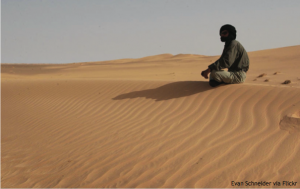
The Saharawi do not have a recognised state. Photo by Evan Schneider via Flickr.
When one thinks of a stalemate, the usual thought that springs to mind is playing a game of chess, when neither side can win and both will declare “Game Over” in order to finish. When one thinks of conflicts, and in particular the Western Sahara conflict, one is reminded a little of a game of chess: with the people acting as the pieces, the history being the moves made, and both Morocco and the Saharawi (indigenous people to the Western Sahara) refusing to cede a win to the other side.
Yet, there is a further twist to this game. Morocco does not recognise their opponent as the Saharawi. Rather, they believe their opponent to be Algeria, who recognisably backs the Saharawi people but makes no claim over the Western Sahara region. The Saharawi people largely live in refugee camps in Tindouf, Algeria, relying on food rations from international donors and living in severe conditions. There are no official estimates, but Algerian sources say there are as many as 170,000 Saharawi living in refugee camps.
The conflict began in the 1950s with the decolonisation of North Africa, which developed into a military affair after the Moroccan King called for “a peaceful liberation of the southern states” following the Spanish withdrawal. The liberation was named the “Green March” and took place in November 1975 – just a year after the International Court of Justice had confirmed Saharawi self determination in an Advisory Opinion. Approximately 350,000 Moroccans moved into the area which is recognised as being the Western Sahara territory: 252,120 square kilometers bordered by Morocco, Algeria, Mauritania and the Atlantic Ocean.
While Morocco entered the Western Sahara from the north, Mauritania also attempted to take control of the area from the south. However, Mauritania was unsuccessful and was ultimately forced to withdraw in 1979, having been defeated by the Frente Popular de Liberación de Saguía el Hamra y Río de Oro (POLISARIO). POLISARIO is the recognised representative of the Saharawi people. The group is outlawed by Moroccan Authorities, who regard it as a rebel force. In fact, the characteristic Moroccan view is that the Saharawi do not exist, believing that Algeria is holding them in the camps against their will and that they are actually Moroccan citizens.
Following Mauritania’s withdrawal, POLISARIO have retained control of the southern Western Sahara. This separation from the north was made permanent by the building of a large sand wall, known as the “Berm”, in 1985. The Saharawi people refer to this area as the “Free Zone”, hidden behind the “Wall of Shame”, which is their name for the Berm. The 2,700km long wall is lined with thousands of densely packed land-mines on the POLISARIO controlled side, and is patrolled by Moroccan troops. The Saharawi say that it is not uncommon to walk through the camps and see people with limbs missing as a result of a mine explosion. This is a tragic reminder of the difficulties of living in the Western Sahara, the place that the Saharawi regard as their homeland.
The fighting continued between POLISARIO and Morocco for about 15 years, only ending when the United Nations pushed for a ceasefire in 1991. This was supposed to be followed by a referendum, as suggested by the International Court of Justice in their 1974 Advisory Opinion, which would allow for self-determination within the region. Yet, despite the United Nations’ attempts, a referendum has never occurred and a stalemate developed ten years later in 2001. The main problem the United Nations faced was identifying those who would be eligible to vote, as the Saharawi were formerly a nomadic people. Despite the United Nations identifying 86,425 eligible voters according to the 1974 Spanish Census, Morocco adamantly rejected the list. Having to deal with each of these cases individually meant that the length of time taken to work out the eligible voters became impractical.
Despite various attempts at negotiations, none has so far been successful. Many mediators involved with the situation in the Western Sahara have regrettably concluded that unless the situation changes, an agreement would not be reached. Perhaps the only way to resolve the stalemate is through compromise on all sides, but the Saharawi seem unlikely to compromise their own identity and homeland, while the Moroccans are reluctant to relinquish territorial control. The international community has provided humanitarian aid to the Saharawi. However, continued support seems uncertain as rations continue to be cut for the refugee camps located in the hostile desert environment. Nevertheless, the Saharawi carry on in their struggle for national identity, instilling the same perseverance within their children, who are likely to have lived in refugee camps their entire lives. They are spurred on by a sense of injustice, and this, it seems, is what maintains the Saharawi spirit.
]]>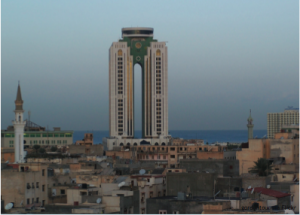
A view of the city centre of Tripoli, Libya's capital and largest city. Photo by gordontour via Flickr.
Muammar Gaddafi’s violent death on October 20th officially ended his 40 years of rule in Libya and propelled the country into an uncertain but hopeful time of change. One of the most immediately contentious issues in Libya is the role of religion in public education, serving as an indicator of Islam’s possible role in the new government. With a literacy rate of 87%, the highest in Northern Africa, Libya’s population is relatively well-educated. Indeed, since his 1969 coup, Gaddafi had instituted compulsory and free public education through high school.
Yet Gaddafi’s educational system was also hugely inconsistent and corrupt, as Dr. Feisel Krekshi discovered on his first day on the job as the new dean of Tripoli University. Aided by young students eager to return to school from the front lines of the rebellion, he discovered war prisoners, intelligence files on students, and a suspicious suite near Gaddafi’s favorite lecture hall containing a Jacuzzi, queen-size bed, and gynecological examining table. Krekshi is also determined to clean the corruption and ineffective teaching from the university, describing the faculty as “90% contaminated” by Gaddafi’s Revolutionary Committees, which previously ran higher education in Libya. Indeed, Krekshi has vowed that “people who called us rats”, those who expressed opposition to the rebel forces, “can’t stay with us.” Some pro-Gaddafi professors have already fled following student protests.
Such vehement attempts to settle old scores have reached beyond the quad to the playgrounds of Tripoli as tensions between Gaddafi loyalists and revolutionaries resonate in their children. Gaddafi’s regime had attempted to insure loyalty through financial means, and many residents of impoverished neighbourhoods remained true to Gaddafi until given word of his death. According to Abdullah al-Ashtar, a local school official in Tripoli, Gaddafi’s loyalists of all ages must keep resentment towards revolutionaries “in their hearts” in order for Libya’s wounds to heal. It is a tall order for provoked students on the schoolyard, some of whom have refused to sing the new national anthem.
Unlike the ideological repression representative of Gaddafi’s era – students at Tripoli University were hanged for dissident beliefs in the 1980s – current leaders, such as the secular temporary Prime Minister Mahmoud Jabril, have promoted ideals of religious tolerance and moderation. Mustafa Abdul Jalil, chairman of the Transitional National Council, has called for a “united and not divided” Libyan people, without “any extremist ideology, on the right or the left.” Yet many individuals, including some able to show outward indications of faith in Islam for the first time in 40 years, have criticized Jabril’s temporary government for being too secular. In a speech in September, Jalil attempted to deny these claims of secularism, explaining his position in “seeking to establish a state government by law and welfare – and Sharia, Islamic law, should be the main source of law.”
As Libya moves forward into the first weeks and months of independence after Gaddafi’s death, the debate over secularism in education will continue to serve as a harbinger of future issues to be resolved in the new government. Mahmoud Shammam, spokesman for the Transitional National Council, has spoken of the government’s respect for “the right of people to express their views peacefully” in “the new Libya”, indicating an openness to discussion and a possible shift into a more tolerant model of Islamic government, striking a balance by offering more rights and opportunities to women and minorities while remaining under Sharia law.
]]>
This past year, a clarion call of defiance echoed from the crumbling palaces in Tripoli to the occupied streets of New York City. Sparked by the self-immolation of a disgruntled market worker, protests in Tunisia ignited a wider movement for political change that spread across a region shackled by censorship and government control. In cities scattered across the world, stagnant economic conditions prompted millions to converge on public spaces in a plight to stem the tide of rising inequality. Elsewhere, local and national struggles, bereft of global media coverage and widespread fanfare, gained momentum.
Against this backdrop, this issue of The Oxonian Globalist presents a snapshot of various communities engaged in struggles against tyranny. In 2011, the Occupy Wall Street movement gained an unprecedented global following, yet failed to articulate a coherent vision for an alternative to the status quo. In Brazil, leaders of the mass movement comprised of agricultural workers assumed great personal risks in their campaign to attain a fairer distribution of land.
Some barriers obstructing the road to statehood were overcome by both Scottish nationalists and the stateless Sahrawi people. If successful, leaders will face a myriad of challenges in their plight to design efficient government structures, attested by public servants charged with crafting education policy in the wake of the Libyan insurrection.
Other articles in this issue confront the nexus between Christianity and homophobia in Africa, the pernicious effect of no-smoking signs, the growing influence of Esperanto, and education policy in Singapore.
We hope you enjoy this issue. If you have any thoughts or comments, please e-mail [email protected].
Thank you for your continued support,

Stephen Wan, Managing Editor (Print Edition)
Mark Longhurst, Editor-in-Chief
]]>
Occupy London. Image by Jack Ratcliffe via Wikimedia.
ACCLAIMED historian Howard Zinn once boldly proclaimed that “democracy doesn’t come from the top, it comes from the bottom.” Indeed every generation has struggled ceaselessly against the overwhelming tides of illegitimate authority. From the Hebrews fleeing slavery in Egypt, to women demanding suffrage in recent times, common goals of freedom and democracy have been hard won.
The torch of liberty has been passed to this generation, and the clash of the powerless with the powerful has manifested in the form of the Occupy movement. This strange phenomenon has been misunderstood and misanalysed by a hostile and condescending corporate media on the one hand, and overly optimistic leftist intellectuals on the other. The fact is that the Occupy protesters know what they are protesting, but are nonetheless unable to articulate a cogent alternative.
Their fight is against an international menace that has permeated societies, breaking apart families, destroying the working class, and poisoning the environment: institutionalised economic injustice. Corrupt organisations, mostly corporations and governments, have tainted the democratic process with lobbying, profligate bailouts, and foreign wars that are perceived to benefit predominantly the wealthy.
Business of the State
This link between the business class and the state is not new. An implicit understanding between business and political interests built the U.S. economy itself. Founding Father Alexander Hamilton implemented a system of tariffs and subsidies to aid American manufacturing. The U.S. military massacred Native Americans to clear the land for railway tycoons. And the original U.S. Constitution condoned slavery, much to the delight of Southern cotton farmers.
In this sense, the Occupy movement is long overdue. The richest 1% of Americans now control 40% of the wealth. Over the past thirty years real wages have stagnated while top incomes have risen, as the rich steadily steal productivity gains from the working class. The United States’ income inequality now parallels that of totalitarian Iran and oligarchic Russia. A few miles from the White House, one can find Washington D.C.’s poorest districts, while in St. Petersburg, the penurious live in the shadows of the prosperous; there are no in-betweens. Is it any wonder then that the rage simmering beneath the surface has now exploded into a cacophony of sound and fury?
This is perhaps why, to shallow observers, the Occupy movement appears inchoate in its aims. A walk through Occupy London, for instance, reveals a potpourri of causes: socialism and anarchism, environmentalism, pacifism, animal rights. There appears no semblance of commonality. Regardless, a careful observer realises that economic injustice underlies many of these societal ills. After all, in modern democracies, the affluent have more political power than the impoverished, where the former maniacally twist the instruments of dominance towards their own designs against the latter.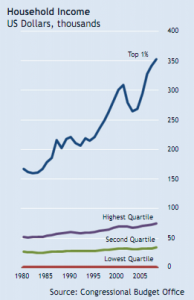
That, then, is the problem. The solution is much more difficult to articulate. Some occupiers endorse greater government largesse, others demand an end to bailouts, and still others seek to abolish the state altogether. Cries for “socialism” occasionally ring out among the troubled masses, but there is no agreement over how to break the cabal that bankers and politicians have established.
The Occupy protesters would rejoin by drawing attention to their particular brand of direct democracy, the general assemblies, whereby key decisions are discussed – anyone is theoretically allowed to speak – and then put to a vote. This experiment in consensus decision-making is just that: an experiment that is unlikely to be adopted by society-at-large. Besides, it is not even that democratic; assembly facilitators can steer conversations as they please.
Engaging Ideas
Is there any truth then to the media’s caricature of protesters as dim-witted ideologues keen on marijuana and two-cent philosophy? Perhaps, but at least occupiers have, finally, engaged the public in dialogue about the intrinsic links between state and corporate avarice. The first step towards recovery is identifying the problem.
But now protesters must focus on recovery itself. Socialism is probably not the answer; the class war has already been won by the capitalists. Voters can seek only to make our current system more fair and equitable. Some elements of the Occupy movement made broadly reasonable demands; an end to corporate welfare programs and hazardous public sector cuts, for instance. They could also have demanded better financial regulation, tighter limits on corporate lobbying, and a return to the Bretton Woods international monetary system. In short, protesters should call on governments to restore the financial system to its original purpose of lubricating the economy, not destroying it.
Still, the light of liberty flickers on from Cairo to New York.
]]>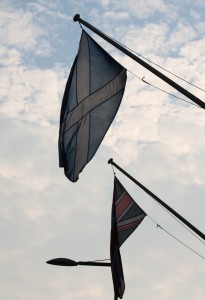
Photo taken by Rachael McLellan.
CONSTITUTIONAL change appears to be coming to the UK, although not quite as the country had expected when it went to the polls on May 5th. The election, which was anticipated to bring about a minor change in the electoral system, has instigated a chain of events that has the potential to sever a 304-year-old union. While the Alternative Vote (AV) electoral system proposal was defeated 69% to 31%, the Scottish National Party (SNP) in Scotland returned with a majority of the government for the first time in its Parliament’s history. Few predicted this landmark result. From mid-2010 until March 2011, opinion polls had indicated that Labour was consistently ahead. The leader of the Scottish Labour Party (SLP), Iain Gray, seemed confident despite his low profile. A poll for the Herald, in early March predicated a Labour landslide. According to their figures, Labour maintained a 15-point lead over the SNP.
The results that actually came to pass, however, were fundamentally different and brought the future of the United Kingdom’s union into serious peril. The SNP increased their vote share to 45%, gaining a majority for the first time. In the northeast region comprised of Aberdeen, Dundee and the surrounding areas, the SNP won all ten constituency seats. Moreover, they gained a top up seat from the regional list, an event considered statistically impossible when the system was designed. Indeed the voting system, which consists of first-past-the-post (FPTP) constituency votes alongside multi-member Proportional Representation regional votes, was constructed to prevent any single party from gaining a majority. This system envisioned either a minority nationalist government or a unionist coalition of some combination of colours. Up until now, the Additional Member System had done its job efficiently.
A Grey Issue
It was Labour’s election to lose and they lost it spectacularly. In Scotland, the media has singled out Labour leader Iain Gray’s incompetence as a primary factor in this historic result. Dubbed the “grey man” by news media, Gray’s lack of charisma allowed Alex Salmond, leader of the SNP, to dominate the leadership debates in late March and April. Soon after, Labour’s poll ratings began to tank.
The SNP have gained massively from the wider context in which the Scottish Parliament sits. Developments in Westminster have shored up support for both the SNP and Scottish independence. The coalition’s sweeping budget cuts are at odds with the Scottish people’s expectations from their government. While the Conservative-led UK government continues to slash public services for those in England, the SNP government at Holyrood has chosen to protect and expand public services. Prescription charges have been eliminated and the lump sum graduate tax abolished. These changes have been widely welcomed by the Scottish people, who are eager to support the SNP’s bid for a second term.
However, the interests of union and nation seem to be diverging. The public’s support for the Conservatives and Liberal Democrats in Scotland has collapsed. The Conservative leader, Annabel Goldie, lost her constituency seat. The Liberal Democrats have suffered most, with representation diminished from 17 seats to five. The party of government until 2007, the Scottish Liberal Democrats now hold only three more seats than the Greens. These election results suggest that disaffected, unionist voters have shifted their allegiance to the SNP.
The long-term impact of this election remains unclear. Upon gaining a majority, Salmond announced his plans to hold a referendum on Scottish independence. The coalition government at Westminster have announced that they have no intention of blocking this vote. A referendum had been planned for this year, but was abandoned when the previous SNP minority administration realised they had no hope of passing the bill through parliament. However, this obstacle no longer exists. A referendum is an all-or-nothing gamble for the SNP. Their raison d’être is working toward an independently governed Scotland. If the electorate rejects independence, they will reject the party’s underlying ideology. If the electorate backs it, the SNP will be vindicated and will subsequently sweep to power.
Uniting Around Division
Commentators are divided over whether the referendum will pass. Scottish elections are unusual; they are both elections for government and referenda on devolution. SNP support is invariably higher than support for independence. However, if the popularity of the party persists, support for independence will grow.
The political skill of Salmond and the SNP should not be underestimated. The SNP have sought independence since they first entered government. First Minister’s Questions are dominated by retorts from Salmond dismissing Scottish problems as side effects of the union. The schools’ curriculum has been amended to focus more thoroughly on nationalistic periods of Scottish history. SNP policy on Trident, education and the NHS is at odds with UK government policy. With the other parties effectively decimated and directionless after the resignations of the leaders of the SLP and the Scottish Liberal Democrats, Scotland is more vulnerable than ever to Salmond’s slick SNP political machine. The future of Scottish independence depends on how successfully Salmond can convince the Scottish people that their identity and their interest lies only in Scotland.
]]>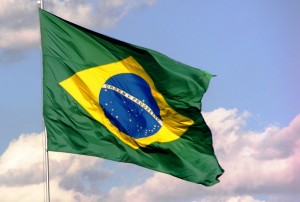
Brazilian Flag. Photo by Gi Varga via Flickr.
ON May 24th 2011, José Cláudio Ribeiro da Silva, a grassroots environmental activist in the Amazonian state of Pará, was ambushed and killed by two gunmen while riding home on a motorcycle with his wife. At the scene, 15 bullet cases were found, and Ribeiro was reported to have had his ear cut off as a gruesome trophy.
His fate is not uncommon in the struggle for land in rural Brazil, where those who fight for the redistribution of land or the protection of the forest face substantial risks. A year before his death, Ribeiro spoke about the threats made against him: “I will protect the forest at all costs. That is why I could get a bullet in my head at any moment – because I denounce the loggers.” Two other people, Eremilton Pereira dos Santos and Adelino Ramos, were murdered shortly after, also by hired killers.
Over 1,000 rural peasants and activists have been killed in the Amazon in the last 20 years. In 2008, the Pastoral Land Commission (CPT), a Brazilian human rights organisation, gave a list of 1,800 names of people who have received credible death threats in recent years. Dozens of those on the list have now been killed, and many others have survived assassination attempts.
It is largely because of an ineffective and corrupt police force that these conflicts often end in murder. Very few of the killers have been prosecuted, and the loggers, ranchers and estate owners behind the murders are rarely brought to justice. In response to the four killings, President Dilma Rousseff promised more resources to protect activists and combat the perceived lawlessness of rural Brazil, attempting to end “an era of impunity for illegal loggers, ranchers and agribusiness.”
From the Ground Up
This violence emerges from one of the most contentious issues within Brazilian society: land reform. Brazil is a country where 1% of the population own roughly half of the arable land. Large landowners and agribusiness corporations create vast
plantations, industrial farms, and, in the Amazon, are responsible for the cutting down of trees and destruction of the forest to create cattle ranches. These agribusinesses use vast amounts of Genetically Modified Organisms and pesticides, all to grow mono-crops primarily for export, such as soy, sugar cane and coffee.
A key group in this struggle is the Movimento dos Trabalhadores Rurais Sem Terra (MST), or the Landless Workers’ Movement, who are the largest social movement in Brazil, with 1.6 million members. Their members largely consist of the rural poor, such as landless peasants and labourers. Their lack of education and colour of their skin often place them within the most marginalised strata of Brazilian society. They seek downward land redistribution, exploiting a passage in the 1988 Constitution, which states that land not being used for social good may be acquired by the government and passed on to others.
They operate through large-scale occupation of ranches and farms, setting up makeshift camps and remaining there, against the intimidation and brutality of the landowners and police, until they acquire the title to the property. They are said to have redistributed 35 million acres of land, and settled 400,000 families.
They are committed to ethical and sustainable use of the land, creating small scale co-operative or family farms, which grow natural food for domestic consumption. They have also set up thousands of schools and health clinics, as well as a university and a natural medicine factory.
They emphasise the importance of keeping the rural population out of the cities and preventing further large-scale migration to urban slums, which are often built precariously on any available space. The dangers of this were made apparent earlier this year, when nearly 1,000 people were killed in Rio de Janeiro by large mudslides that destroyed slums built on steep hills.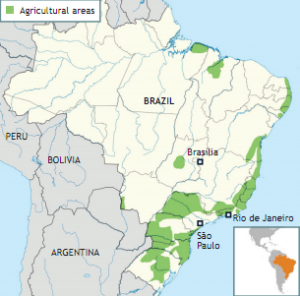
Organising for Rights
For the people involved, the importance of being in groups such as the MST cannot be underestimated. Through these sorts of organisations, people who would otherwise be working in slave-like conditions for industrial farms or living in the slums of the major cities are given opportunities for acquiring land, education and healthcare. These people gain rights and dignity that they would otherwise never have.
Grassroots movements such as the MST and activists such as Ribeiro are crucial to democratisation and reform in Brazilian society. Those who would otherwise be voiceless are empowered through direct action, which includes occupying land and buildings, blockading highways, and marching from city to city.
While the former president, Luiz Inácio Lula da Silva, was often celebrated as a champion of social welfare, land reform remained one of his less progressive policies. While traditionally seen as an ally of those who sought land reform, Lula is now perceived by the MST to have taken sides with the large landowners and agribusinesses, by helping to considerably expand their practices throughout Brazil.
Between 2003 and 2007, state support for the rural elite was seven times higher than that offered to family farmers, even though the latter represented 87% of the work force and produced the bulk of domestic food consumption. A leader of the MST is reported to have said that their former friend, Lula, “has now become a friend of our enemies.” His successor Dilma is also seen to have inherited this particular mantle.
Brazil’s Tensions
While programs such as Bolsa Família and Fome Zero have helped to raise millions out of poverty and provide them with basic security, groups such as the MST argue that they do not provide the structural reform that is necessary to combat the extreme inequality, exclusion, division and racism that is present in the old structures of Brazilian society. Brazil’s economic successes have helped to turn it into one of the world’s most powerful economies, but soaring GDP has not solved the country’s social problems. Instead, the MST and others would argue that it has merely benefited a select elite.
This sort of activism marks the tensions within Brazilian society. Other examples of class conflict involve street gangs, drugs and violence. It is important that grassroots movements continue to push for environmentally and socially sustainable use of the land, protecting the forests and providing dignity and security to the poorest and most marginalised Brazilians.
]]>
